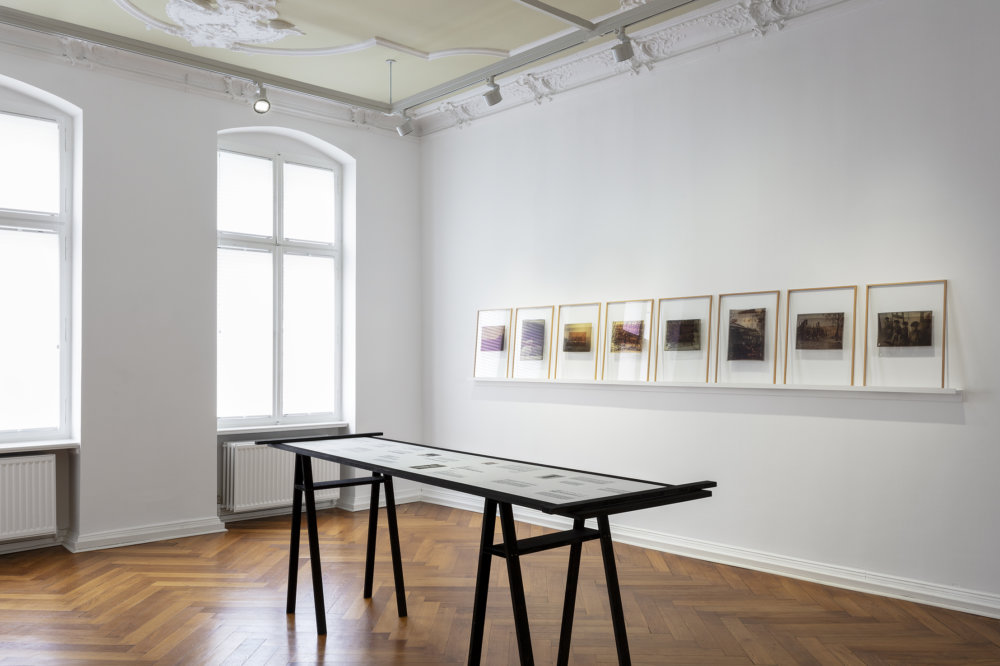Installation views of my new solo exhibition in Berlin on my long, on-going project re-narrating the anti-colonial war in British Malaya — a story that is as small and as large as one can make it, for all the resonances across the decolonisation wars in the “Third World” at the time. A period of history that has long threads to contemporary politics, and a full reckoning with it, I believe, can help us understand the world that we live in. The war in Malaya set the template for counter insurgency conflicts to come, including Vietnam, Iraq — and the one most present in our minds today: Afghanistan. With this latest show, I work with shifts across materiality and time. It is on at Zilberman Gallery Berlin till 27 November.
Pictures by CHROMA.
https://www.art-agenda.com/announcements/411893/sim-chi-yinone-day-we-ll-understand
Two revolutionary songs—The Internationale and Goodbye Malaya—are included in Sim Chi Yin’s video installation Requiem. We hear the voices of former deportees and exiles, some of whom are still not allowed to return to Malaysia. The sound of their fragile voices, sometimes forgetting the lyrics, permeates the exhibition One Day We’ll Understand at Zilberman Gallery. These voices suffused with a sense of loss echo as we take in the atmospheric landscape photographs the artist has made of sites of memory of this war around present-day Malaysia and southern Thailand. In one scene at dusk, an elephant emerges out of the jungle thicket, a split-second encounter that transforms into an apparition. A table with empty chairs suggests the absence of the former anti-colonial fighters or people displaced and killed in acts that have still not been accounted for today, while British and Commonwealth soldiers are commemorated at heroes’ cemeteries.
Sim Chi Yin’s solo exhibition One Day We’ll Understand questions the colonial and postcolonial histories and historiographies of the 12-year guerrilla war in British Malaya (an area today covered by Malaysia and Singapore), which the British colonial power euphemistically termed the “Malayan Emergency” (1948–60). Communists, who had led the resistance against Japan in World War II, now spearheaded the anti-colonial struggle. It was one of the early hot conflicts in the global Cold War, using tactics such as population-control strategies and the defoliant chemical Agent Orange years before the Vietnam War. British authorities tried to break the resistance through detentions, deportations, and the resettlement of civilians from the edges of the jungle to so-called ‘New Villages’ to starve the communist insurgents of supplies of food, medicine and men.
One Day We’ll Understand is rooted in Sim’s family history, namely the history of her paternal grandfather, a journalist and left-wing intellectual. Like over 30,000 other leftists and sympathisers, he was imprisoned by the British and deported to China, where he was later executed by the ruling Kuomintang government. Starting with this personal story, Sim expands her research into an historical and artistic examination of the official and colonial historiographies of the war and its combatants.
In her most recent series “Interventions,” Sim Chi Yin excavates photos from the colonial archive at the Imperial War Museum in London that were used by British authorities for media campaigns and psychological warfare to legitimise national military operations against anti-colonial fighters. Sim has photographed these prints on a light table so that the markings and labelling, which would otherwise be concealed on the back, can be seen through the image like a palimpsest. The transparency of the foil prints on glass plates enables viewing from two sides, with either the text or the image appearing back-to-front. Who has the power to define? Sim questions the indexicality of material evidence by exposing the mechanisms of colonial interpretation.
Text: Lotte Laub
Accompanying the exhibition, a catalogue featuring essays by Sam I-shan and Anthony Downey, a conversation between Sim Chi Yin and Hilary Roberts, and an introduction by Lotte Laub will be published.
Listed as a “must-see” during Berlin Art Week by Art Net News:
https://news.artnet.com/art-world/must-see-art-guide-berlin-september-2021-2009330
A 360 view of the show: https://www.artland.com/exhibitions/one-day-well-understand-76ffcf










